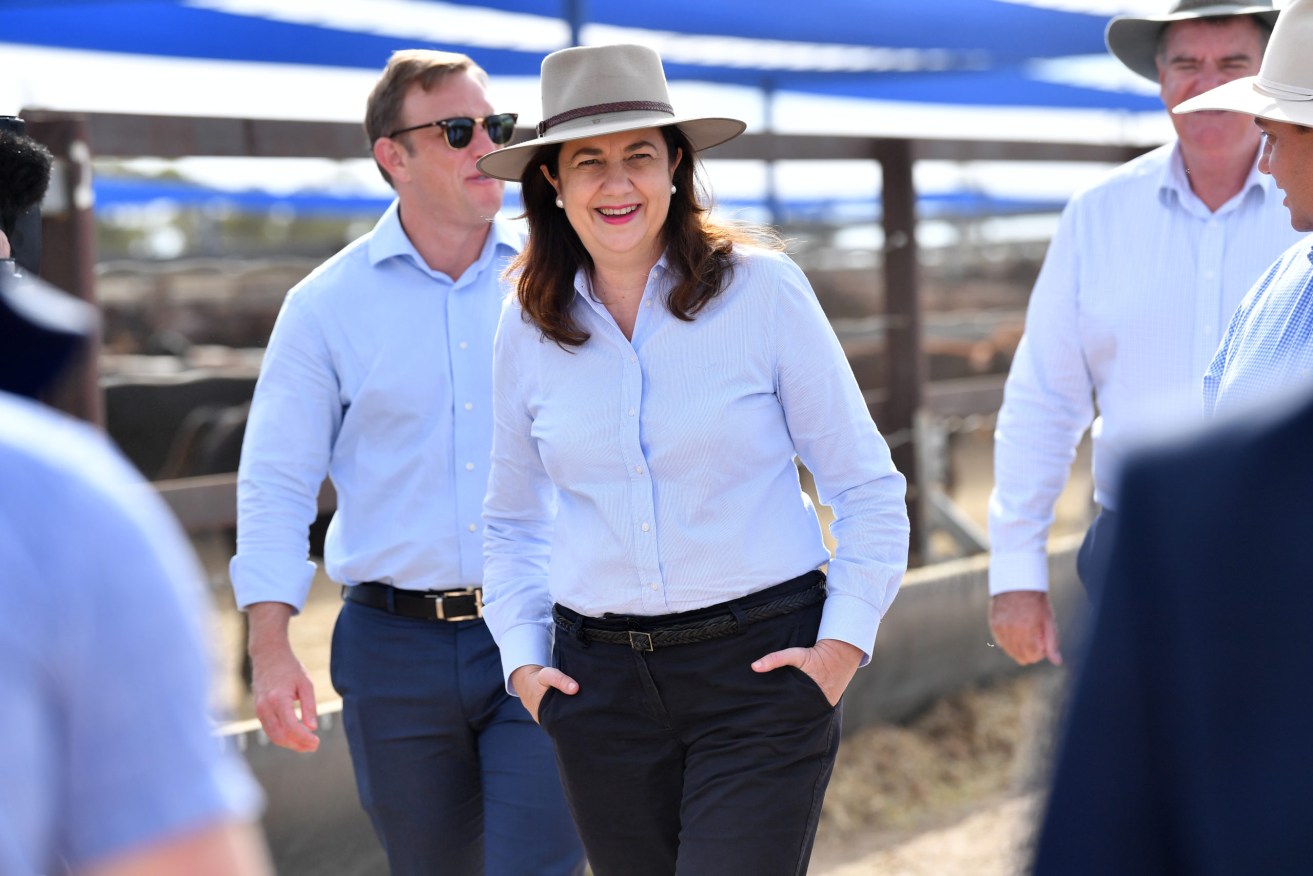It’s not easy being green: Beef industry plots difficult course as new eco warrior
The environmental challenge confronting beef producers in a carbon-constrained economy has dominated discussions on the second day of Beef Australia in Rockhampton.


Queensland Premier Annastacia Palaszczuk (centre) is seen at the Longreach saleyards on Tuesday, where State Cabinet met as part of her tour of regional Queensland. (AAP Image/Darren England)
A day after Prime Minister Scott Morrison breezed through the event to announce funds to fight biosecurity threats, industry leaders at a Rabobank breakfast have heard that moving toward a carbon neutral position with speed will help secure long-term success.
Observing events from his base in Europe and the position taken by global meat processor JBS to strive towards carbon neutrality by 2040, the bank’s EU analyst Justin Sherrard said it would take all beef supply chain partners to improve the industry’s environmental credentials.
Part of that process, he said, was listening more to what the customer, via public opinion, wants from food producers, and for farmers and their supply chain partners to capture data, measure their performance and adopt new technology.
While Sherrard said there would be costs for farmers to adapt their operations to the changing regulatory environment, there would also be opportunities, although price premiums for products with verified green credentials, would be limited in the short term.
“Think about this as how we add value to our business,” he said.
The comments came on the same day as the launch of the Australian Beef Sustainability Framework’s (ABSF) fourth annual update.
Key highlights from the report include:
- A 51.46 per cent reduction in the carbon footprint of the industry since the baseline year of 2005.
- An estimated 30 per cent of producers now use pain relief for routine, necessary husbandry practices. This is has increased from 21 per cent last year
- The processing sector reduced the amount of CO2E emitted per hot tonne standard carcase weight by 8.1 per cent when processing beef, and further reduced water usage by 7.9 per cent.
The ABSF defines sustainable beef production and tracks performance over a series of indicators annually.
Chair of the sustainability steering group for the ABSF, Tess Herbert, said despite a year of unprecedented challenges, the report card revealed that the Australian beef industry was heading in the right direction.
“The past year has been like no other – travel restrictions, lockdowns, quarantine and global disruption have disrupted supply chains and important revenue pathways,” Herbert said.
“Despite the many challenges, responses to our producer sustainability survey increased four-fold demonstrating producers are more engaged with the process of promoting industry transparency and progress.
The strides towards shrinking the industry’s environmental footprint were announced prior to the arrival of Premier Annastacia Palaszczuk, who officially opened Beef Australia yesterday, praising the industry for its contribution to the Queensland economy.
Earlier in the day she had been in Longreach with Deputy Premier Steven Miles, Treasurer Cameron Dick and Agriculture Minister Mark Furner to announce a major redevelopment of the saleyards which will see 100,000 head of cattle a year pass through the complex.
“Being able to hold events like Beef 2021, an exceptional mix of industry, entertainment and food, is critical to Queensland’s economic recovery,” she said.
“This is an incredible boost for the regional economy, tourism and for Queensland’s world-renowned beef industry.
“I am in constant awe of the ongoing strength of the beef cattle sector and the people who drive this industry day in and day out and this event is a wonderful celebration of them.
“When it comes to growing Queensland exports and jobs, no industry is bigger than beef, with cattle grown in almost every region and a state-wide herd of more than 11.1 million head – about half the national total.
“As Queensland’s largest manufacturing industry, the meat processing sector supports more than 18,500 jobs. The gross value of beef production at the farm gate is more than $6 billion with exports to 66 countries worth $6.7 billion.”
Day three of the six-day Beef Australia event continues today, with seven mayors from across central and western Queensland using the opportunity to launch a campaign on achieving upgrades to key beef road networks.
The Gladstone, Isaac, Banana, Central Highlands, Woorabinda, Barcaldine and Blackall-Tambo mayors have joined forces to call for action from the State and Federal governments to upgrade Queensland’s ‘beef corridors’ – a strategic supply chain of roads stretching more than 2000km across central and western Queensland that are vital to the industry.








